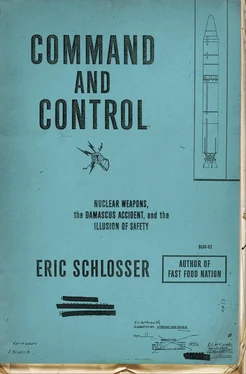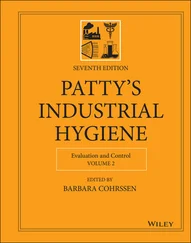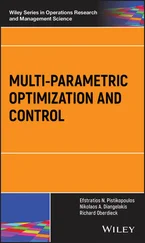The missile combat crew was glad to be outdoors, with a good half a mile between them and the silo. The night was warm, help was on the way, everybody had made it out of the complex safe and sound. The problem with the missile hadn’t been solved, but the mood was calm. Then Rodney Holder looked up and saw that the helicopter was about to hit some power lines. The pilot couldn’t see them in the dark, and the chopper was descending straight toward them. Holder started to yell and wave his arms, and then Mazzaro, his commander, noticed, too. “Tell the helicopter not to land,” they both shouted, frantically, to the security officer in the pickup. “Tell it not to land!” In an instant, Holder had gone from feeling chilled and relaxed to being absolutely terrified, convinced that the chopper was going to hit the power lines, spin out of control, and explode. It didn’t. At the last minute, the pilot saw the wires, dodged them, and landed safely in a field near a farmhouse on the other side of the highway.
Morris and Kennedy climbed from the copter and joined the men waiting on the access road. While Mazzaro spoke to the colonel about the accident, Kennedy and Holder discussed what should be done next. Kennedy didn’t think much of Mazzaro and couldn’t believe that his crew had abandoned the complex. But Kennedy got along with Holder. The two had taken some college classes together at the base and felt a mutual respect. They disagreed now, however, about whether there was a fire in the silo. Kennedy decided to see for himself. He asked Colonel Morris for permission to enter the site — and to bring David Powell, the airman who’d dropped the socket, with him.
Powell was one of Kennedy’s closest friends in the Air Force. When Kennedy was a PTS team chief, Powell served as his right-hand man. Kennedy could count on Powell to do just about anything. He used Powell to train new PTS technicians, and Powell hoped to become a team chief himself, maybe a noncommissioned officer. Powell was always calm and reliable. But now he seemed anxious, agitated, upset. After the helicopter landed, Powell had run up to him and said, “Jeff, I fucked up like you wouldn’t believe.”
Powell added another detail: not only had he dropped the socket but he’d also used the wrong tool with it. A recent technical order said that a torque wrench always had to be used when tightening or loosening a fuel cap in the silo. The torque wrench ensured that a precise amount of pressure could be applied to the cap. Earlier that evening, Powell and Plumb had reached level 2 of the silo, fully dressed in their RFHCOs, before realizing that they’d left the torque wrench behind in their truck.
PTS Team A had already spent ten hours on the job that day. Everybody was tired, and instead of sending someone topside to get the torque wrench, wasting another ten or fifteen minutes, Powell grabbed the ratchet hanging on the wall near blast door 9. The socket fit on the ratchet, and for years PTS teams had used that ratchet instead of a torque wrench, without any problems. Powell had done it, Kennedy had done it, just about every PTS team had done it. This time the socket slipped off. And using the wrong tool could get Powell in even more trouble.
“Oh, David,” Kennedy said. “David, David, David.”
Colonel Morris liked Kennedy’s idea. They could use a better look at what was coming out of the exhaust vents. But Morris didn’t want anyone venturing too close to the silo. Captain Mazzaro approved the plan, as well. Technically, he was still in command of the launch complex. After arriving at the site that morning, he’d signed for the missile and the warhead — they were his responsibility — and he didn’t want Kennedy and Powell to go near the complex unaccompanied. Mazzaro and his deputy, Al Childers, still wearing their handguns, would go with them. The two officers and the two enlisted men started down the access road in the darkness, carrying flashlights.
• • •
SAM HUTTO’S FAMILY HAD FARMED the same land for generations. The inscription on his great-great-grandfather’s tombstone said: PIONEER OF VAN BUREN COUNTY AND FOUNDER OF DAMASCUS. The Huttos had come to Arkansas before the Civil War, and the town they settled had originally been called Huttotown — until another set of Sam’s ancestors, the Browns, decided to find a name with a more biblical flavor. “Damascus” sounded like a place that would one day be important, a worthy rival to Jerusalem, Arkansas, about thirty miles to the east. For decades, life in Damascus remained largely the same, as farmers struggled on small landholdings with thin topsoil. The poverty seemed as unchanging as the landscape. Even the Great Depression didn’t leave much of a mark. “We went into, through, and out of the Depression,” Hutto’s father once said, “and never knew we had one.”
Despite the challenges of rural life, Sam Hutto thought his childhood was perfect. He was born in 1954, the same year his father quit raising chickens and opened a feed mill in Damascus. Everybody in the community seemed to know one another and be related to one another, somehow. Their children roamed everybody’s land and hunted pretty much wherever they liked. The feed mill was about two miles from Hutto’s house, and his parents let him leave home in the morning with a fishing pole and slowly make his way to the mill, as long as he arrived by quitting time. Hutto went to school a couple of miles from the farm, left town to attend the University of Arkansas in Fayetteville, spent about a year or so there, dropped out, lasted a semester at Arkansas Tech University in Russellville, then came home. He had little use for the world beyond Damascus. Working at his father’s mill gave him a chance to attend feed meetings and conferences throughout the United States — and Hutto never went anywhere that he didn’t want to come home from.
For years, the Titan II sites in Van Buren County didn’t attract much attention. Their construction had briefly provided some high-paying jobs, and the fire in the silo at Searcy had taken the lives of a few men from Damascus. But once the launch complexes were operational, most people never thought about them. Sam Hutto would occasionally see crews in their Air Force blue pickups, coming or going from the site near Damascus. Sometimes they’d stop at the little grocery store to buy sodas and candy. The launch complex was just another local landmark, useful for giving directions. You could tell somebody who wanted to visit Ralph and Reba Jo Parish: head north from Damascus on Highway 65 for a few miles, pass the access road to the missile base, and their house will be the first one on the left.
The oxidizer leak in January 1978 was the first sign that having a Titan II in the neighborhood might be a problem. Hutto was working in the barn when he heard about the leak. He was twenty-three years old, helping his father and his older brother, Tommy, run the farm. A few years earlier the family had sold the feed mill and gone into the dairy business. As a milk truck backed into the barn, the driver said something about passing through a bright orange cloud on the way over. Hutto stepped outside to take a look. Their farm was on a hillside about three quarters of a mile southeast of the launch complex, with Highway 65 running between them. Down below Hutto could see an orange cloud encircling the complex and slowly drifting south. He didn’t think much of it and went back to work. His father, who was chopping wood about two miles due south of 4–7, thought the cloud tasted funny as it drifted past. It gave him a headache but didn’t make him sick. When word spread that the orange fumes had killed some cattle and sent Sheriff Anglin to the hospital, the residents of Damascus began to wonder about the safety of the Titan II missile that sat about a mile from their elementary school. The Air Force response to the leak — the assurances that everything was under control and that the missile was perfectly safe — did not reassure them.
Читать дальше












